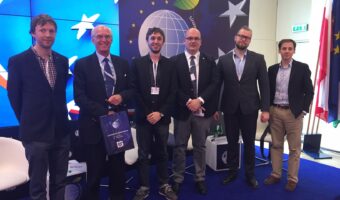The 2nd European Congress of Local Governments organised by the Institute for Eastern Studies is a large international event that gathers together regional elites, local government leaders, NGOs and representatives of business organisations. The title of this year’s congress is: Local Government Today – People, Cooperation, Innovations. The European Congress of Local Governments is a platform for the exchange of opinions and a meeting-place. The diversified programme of the congress was centred around five major themes and encompassed over 60 events: theme-based blocks, reports, panels, workshops, lectures, presentations and a ceremonial gala. IBS co-organised a discussion panel in the block on economy. The discussion panel entitled
The Role of Local Governments in Reducing Energy Poverty
was attended by: Aleksander Szpor (Institute for Structural Research, Poland), Melville Kendal (Working Group on Energy and Climate Change, Assembly of European Regions, UK), Julije Domac (North-West Croatia Regional Energy Agency, Croatia), Neil Simcock (University of Manchester, UK) and Antoni Fałkowski (Energy Data Lab, Poland). TOK FM radio journalist Jakub Janiszewski was the moderator of the event.
Summary of the panel
Aleksander Szpor (IBS) introduced the participants to the subject of energy poverty. He presented the rationale for introducing the term “energy poverty” rather than, say, “opera poverty” or “beer poverty”. As he pointed out, energy expenses fulfil basic needs (such as heating one’s flat, cooking meals or lighting) and cannot be postponed. Limiting energy expenses is not easy, as in many cases it requires long-term planning of the household budget and a degree of technical knowledge. The analyst stressed that the importance of energy expenses for the problem of poverty in general is demonstrated, e.g., by the fact that they are the second largest group of household expenses (after food). Importantly, these expenses are not flexible, owing to the very nature of energy as commodity – its fixed quality limits the possibility to vary the price. He also referred to IBS and InE research, according to which the energy poor in Poland made up 17% of the society in 2013 – these were predominantly inhabitants of single-family homes, rural areas and single parents. Aleksander Szpor argued that this problem should be more clearly addressed at the government level and solved through the cooperation of local governments with NGOs and the private sector.
Energy poverty as a form of social injustice
Dr Neil Simcock from the University of Manchester referred to the history of this phenomenon in the United Kingdom – the cradle of research on the subject. Work began in the 1970s as a reaction to the health problems of Britons inhabiting under-heated and uninsulated homes and the resulting social exclusion. Dr Simcock emphasised that energy poverty should be treated separately from income poverty, since even with satisfactory income one could incur energy expenses that formed too large a part of the household budget. Energy poverty may thus be seen as a form of social injustice, which is why the state is obliged to act. Councillor Melville Kendal, Conservative Member for New Milton, argued that counteracting energy poverty required pragmatic actions. In New Milton, such actions take on two main forms. First of all, Kendal believes that the “Insulate Hampshire” programme focused on insulating buildings is the main guarantee of providing assistance to persons inhabiting under-heated homes. Secondly, there is a programme of house visits on energy efficiency in one’s place of residence. Tariffs reducing energy costs and exchanging heating furnaces for more efficient ones are also helpful. Dr Julije Domac from the North-West Croatia Regional Energy Agency presented the scale of the problem in Croatia. Around 15% of Croatians are regarded as energy poor. A similar percentage corresponds to households inhabiting homes that have leaky roofs or are under-heated in winter. A partial solution to the problem may be found in renewable energy sources, e.g. solar panels. Antoni Fałkowski from Energy Data Lab pointed to the role of conscious energy consumption in limiting energy poverty. The work of Energy Data Lab suggests that the average John Smith has no idea about his energy expenses. Making households aware of their energy expenses and comparing them to similar households results in lower energy consumption. Fałkowski proposed that energy providers should have an obligation to inform households about their energy consumption, which could be one of the methods of reducing energy poverty.
Confronting research with the real needs of the poor
The participants agreed that further research was needed on the subject, and that scientific research should be confronted with the real needs of the poor. Neil Simcock stressed the need to develop a statutory definition of energy poverty which would be used to grant aid. Melville Kendal pointed to the fact that financing tangible aid for the energy poor was more important than conducting research. At the end of the panel, a discussion ensued on the influence of the anti-smog law on exacerbating the problem of energy poverty and on the efficiency of the energy allowance and thermal modernisation.
***
More details about the Congress available on the website.
 II-EKS-folder
II-EKS-folder


